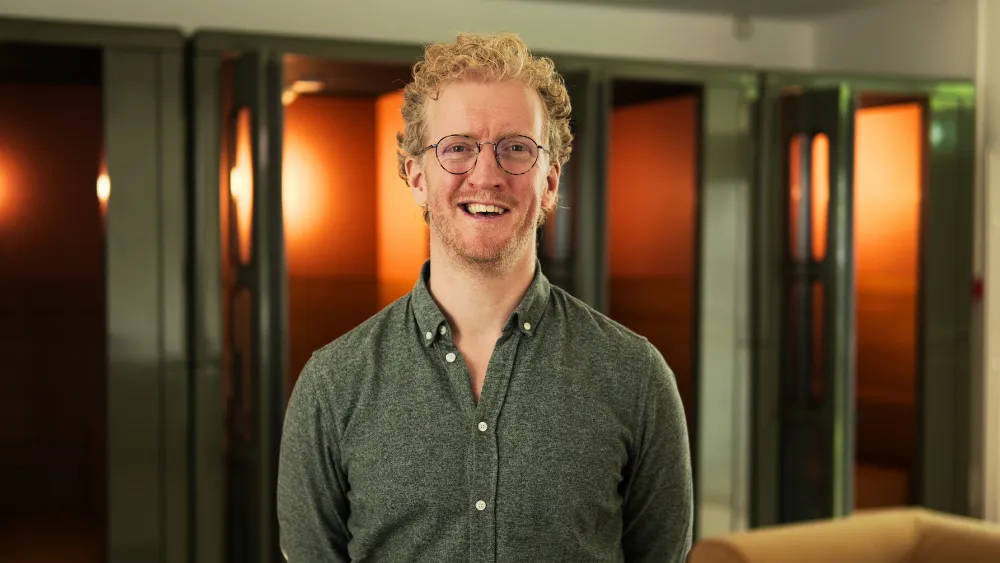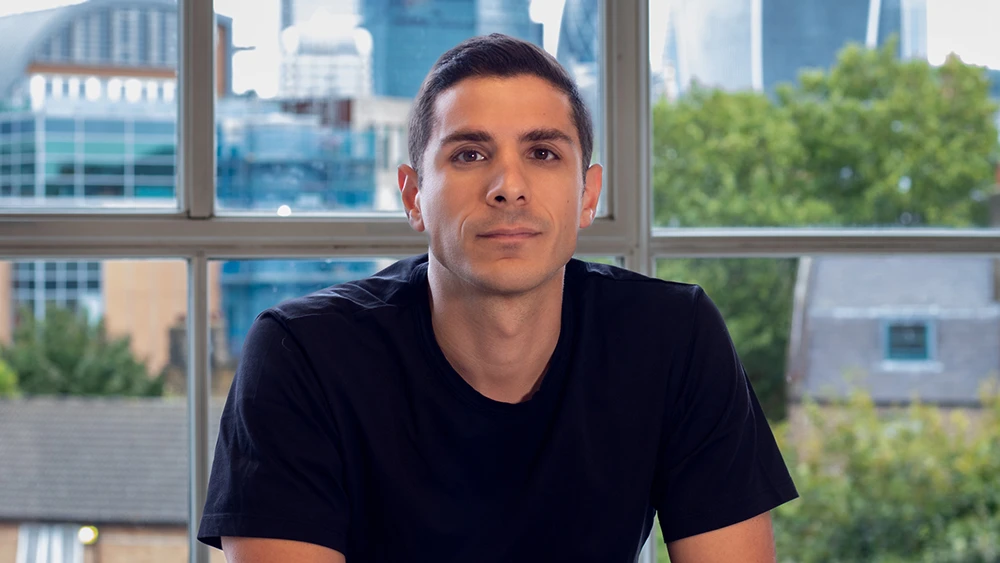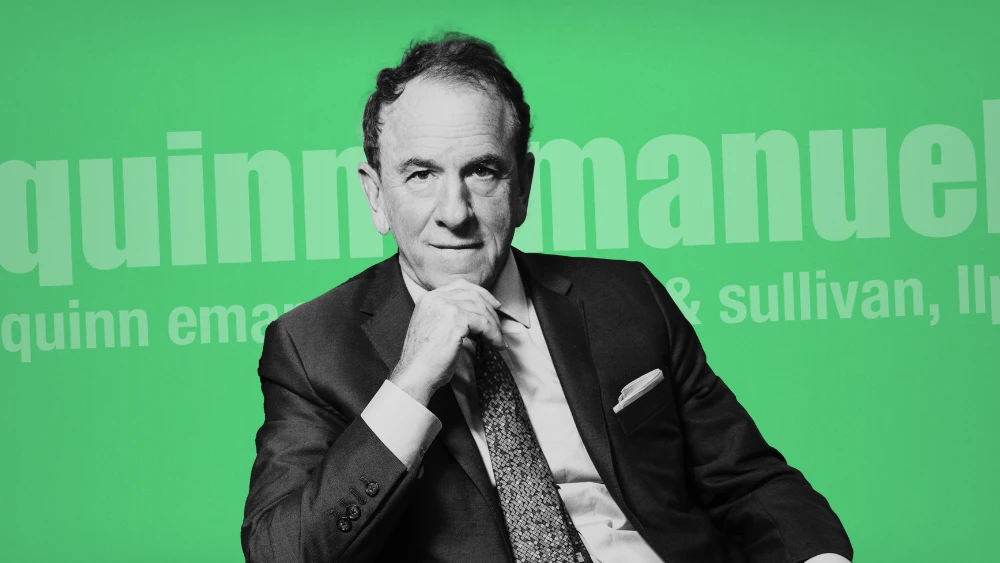Turning legal into a revenue driver: Wordsmith CEO Ross McNairn on the future of in-house and building a $100m legal AI company
Ex-lawyer and Wordsmith founder Ross McNairn is on a mission to transform in-house legal teams.

Contents
Wordsmith has quickly become one of the most closely watched legal AI startups in Europe. The Edinburgh-based company recently closed a $25 million Series A round led by VC firm Index Ventures - bringing its total raised to $30 million - and hit a $100 million valuation, making it the fastest Scottish startup to do so (according to the company).
But unlike many AI-first legal tech companies going after law firms or litigation automation, Wordsmith is betting on a very specific user: the in-house lawyer.
"We're built for in-house legal teams, specifically", says Ross McNairn, Wordsmith’s co-founder and CEO in a conversation for The Non-Billable Podcast. "We built an AI assistant that helps their in-house lawyers get more productive in their individual work, but also - critically - in how they interact with the rest of the business."
Listen to the full-length interview on the podcast. Episode page with links here.
Stay ahead of the City law market with our free email briefing - essential industry news and analysis, in your inbox three times a week.
At its core, Wordsmith is an AI platform designed to triage the constant flow of inbound legal requests from across a company - via Slack or email - and either respond to them autonomously or support a lawyer in doing so. "Most of your pain [in-house] is not contained in your laptop. It's the inbound and the noise and the other things that come your way. So Wordsmith helps with that."
A different problem
McNairn, who trained as a lawyer in Scotland, says the idea for Wordsmith came from watching legal teams struggle while working inside a fast-growing company. "I saw a lot of people that were super bright and capable with just very poor tooling", he says. "I felt what happened when you had legal in a good place and legal in a bad place."
What makes in-house legal unique, he argues, is how central (and exposed) they are to business functions. "They're kind of the heart of a company. And if your heart's not beating properly, the whole company suffers from it."
This is also why he believes Wordsmith’s value extends beyond productivity. "If legal becomes highly productive in a business, every deal speeds up. The CEO gets super happy. Other execs are delighted with it. The impact is way bigger if you can crack it for that goal."
If legal becomes highly productive in a business, every deal speeds up. The CEO gets super happy.
Law Firm | Trainee First Year | Trainee Second Year | Newly Qualified (NQ) |
|---|---|---|---|
| Addleshaw Goddard | £52,000 | £56,000 | £100,000 |
| Akin | £60,000 | £65,000 | £174,418 |
| A&O Shearman | £56,000 | £61,000 | £150,000 |
| Ashurst | £57,000 | £62,000 | £140,000 |
| Baker McKenzie | £56,000 | £61,000 | £145,000 |
| Bird & Bird | £48,500 | £53,500 | £102,000 |
| Bristows | £48,000 | £52,000 | £95,000 |
| Bryan Cave Leighton Paisner | £50,000 | £55,000 | £115,000 |
| Burges Salmon | £49,500 | £51,500 | £76,000 |
| Charles Russell Speechlys | £52,000 | £55,000 | £93,000 |
| Cleary Gottlieb | £62,500 | £67,500 | £164,500 |
| Clifford Chance | £56,000 | £61,000 | £150,000 |
| Clyde & Co | £48,500 | £51,000 | £85,000 |
| CMS | £50,000 | £55,000 | £120,000 |
| Cooley | £55,000 | £60,000 | £157,000 |
| Davis Polk | £65,000 | £70,000 | £180,000 |
| Debevoise | £55,000 | £60,000 | £173,000 |
| Dechert | £55,000 | £61,000 | £165,000 |
| Dentons | £52,000 | £56,000 | £104,000 |
| DLA Piper | £52,000 | £57,000 | £130,000 |
| Eversheds Sutherland | £50,000 | £55,000 | £110,000 |
| Farrer & Co | £47,000 | £49,000 | £88,000 |
| Fieldfisher | £48,500 | £52,000 | £100,000 |
| Freshfields | £56,000 | £61,000 | £150,000 |
| Fried Frank | £55,000 | £60,000 | £175,000 |
| Gibson Dunn | £60,000 | £65,000 | £180,000 |
| Goodwin Procter | £55,000 | £60,000 | £175,000 |
| Gowling WLG | £48,500 | £53,500 | £105,000 |
| Herbert Smith Freehills Kramer | £56,000 | £61,000 | £145,000 |
| HFW | £50,000 | £54,000 | £103,500 |
| Hill Dickinson | £43,000 | £45,000 | £80,000 |
| Hogan Lovells | £56,000 | £61,000 | £140,000 |
| Irwin Mitchell | £43,500 | £45,500 | £78,000 |
| Jones Day | £60,000 | £68,000 | £165,000 |
| K&L Gates | £50,000 | £55,000 | £115,000 |
| Kennedys | £43,000 | £46,000 | £85,000 |
| King & Spalding | £62,000 | £67,000 | £175,000 |
| Kirkland & Ellis | £60,000 | £65,000 | £174,418 |
| Latham & Watkins | £60,000 | £65,000 | £174,418 |
| Linklaters | £56,000 | £61,000 | £150,000 |
| Macfarlanes | £56,000 | £61,000 | £140,000 |
| Mayer Brown | £55,000 | £60,000 | £150,000 |
| McDermott Will & Schulte | £65,000 | £70,000 | £174,418 |
| Milbank | £65,000 | £70,000 | £174,418 |
| Mills & Reeve | £45,000 | £47,000 | £84,000 |
| Mischon de Reya | £50,000 | £55,000 | £100,000 |
| Norton Rose Fulbright | £56,000 | £61,000 | £135,000 |
| Orrick | £60,000 | £65,000 | £160,000 |
| Osborne Clarke | £55,500 | £57,500 | £97,000 |
| Paul Hastings | £60,000 | £68,000 | £173,000 |
| Paul Weiss | £60,000 | £65,000 | £180,000 |
| Penningtons Manches Cooper | £48,000 | £50,000 | £83,000 |
| Pinsent Masons | £52,000 | £57,000 | £105,000 |
| Quinn Emanuel | n/a | n/a | £180,000 |
| Reed Smith | £53,000 | £58,000 | £125,000 |
| Ropes & Gray | £60,000 | £65,000 | £165,000 |
| RPC | £48,000 | £52,000 | £95,000 |
| Shoosmiths | £45,000 | £47,000 | £105,000 |
| Sidley Austin | £60,000 | £65,000 | £175,000 |
| Simmons & Simmons | £54,000 | £59,000 | £120,000 |
| Simpson Thacher | n/a | n/a | £178,000 |
| Skadden | £58,000 | £63,000 | £177,000 |
| Slaughter and May | £56,000 | £61,000 | £150,000 |
| Squire Patton Boggs | £50,000 | £55,000 | £110,000 |
| Stephenson Harwood | £50,000 | £55,000 | £105,000 |
| Sullivan & Cromwell | £65,000 | £70,000 | £174,418 |
| Taylor Wessing | £52,000 | £57,000 | £115,000 |
| TLT | £44,000 | £47,500 | £85,000 |
| Travers Smith | £55,000 | £60,000 | £130,000 |
| Trowers & Hamlins | £47,000 | £51,000 | £85,000 |
| Vinson & Elkins | £60,000 | £65,000 | £173,077 |
| Watson Farley & Williams | £51,500 | £56,000 | £107,000 |
| Weightmans | £36,000 | £38,000 | £70,000 |
| Weil | £60,000 | £65,000 | £170,000 |
| White & Case | £62,000 | £67,000 | £175,000 |
| Willkie Farr & Gallagher | £60,000 | £65,000 | £170,000 |
| Withers | £47,000 | £52,000 | £95,000 |
| Womble Bond Dickinson | £43,000 | £45,000 | £83,000 |
Rank | Law Firm | Revenue | Profit per Equity Partner (PEP) |
|---|---|---|---|
| 1 | DLA Piper* | £3,130,000,000 | £2,500,000 |
| 2 | A&O Shearman | £2,900,000,000 | £2,000,000 |
| 3 | Clifford Chance | £2,400,000,000 | £2,100,000 |
| 4 | Hogan Lovells | £2,320,000,000 | £2,400,000 |
| 5 | Linklaters | £2,320,000,000 | £2,200,000 |
| 6 | Freshfields | £2,250,000,000 | Not disclosed |
| 7 | CMS** | £1,800,000,000 | Not disclosed |
| 8 | Norton Rose Fulbright* | £1,800,000,000 | Not disclosed |
| 9 | HSF Kramer | £1,360,000,000 | £1,400,000 |
| 10 | Ashurst | £1,030,000,000 | £1,390,000 |
| 11 | Clyde & Co | £854,000,000 | Not disclosed |
| 12 | Eversheds Sutherland | £769,000,000 | £1,400,000 |
| 13 | Pinsent Masons | £680,000,000 | £790,000 |
| 14 | Slaughter and May*** | £650,000,000 | Not disclosed |
| 15 | BCLP* | £640,000,000 | £790,000 |
| 16 | Simmons & Simmons | £615,000,000 | £1,120,000 |
| 17 | Bird & Bird** | £580,000,000 | £720,000 |
| 18 | Addleshaw Goddard | £550,000,000 | £1,000,000 |
| 19 | Taylor Wessing | £526,000,000 | £1,100,000 |
| 20 | Osborne Clarke** | £476,000,000 | £800,000 |
| 21 | DWF | £466,000,000 | Not disclosed |
| 22 | Womble Bond Dickinson | £450,000,000 | Not disclosed |
| 23 | Kennedys | £428,000,000 | Not disclosed |
| 24 | Fieldfisher | £385,000,000 | £1,000,000 |
| 25 | Macfarlanes | £371,000,000 | £3,100,000 |
What do City lawyers actually do each day?
For a closer look at the day-to-day of some of the most common types of lawyers working in corporate law firms, explore our lawyer job profiles:
How it works
Wordsmith is built as a legal co-pilot, but acts more like a team of AI agents, each trained for specific workflows like NDA reviews, third-party supplier contracts or employment contracts. "We give them a workspace that individually speeds them up", McNairn explains. "We're awesome with documents - drafting, reviewing - but we also integrate with all the systems in a business."
When a request comes in from another part of the company, Wordsmith’s AI does the initial review, drafts redlines or summary responses, and tees it up for a lawyer to approve or send - or in some cases, handles the reply automatically under strict controls.
"We keep the lawyer in the loop with a sort of dead man switch", McNairn says. "The AI can do everything in the flow, but you can insert yourself and monitor it. You also get the productivity gains."
This "bouncer with a law degree" model, as one GC described it, helps to filter the more commoditised tasks which should leave the human lawyers with the chance to work on the highest-value things. "It’s turning everybody from being authors into being editors for repetitive tasks."
It’s turning everybody from being authors into being editors for repetitive tasks.
Getting customers
Wordsmith’s traction is mainly driven by word of mouth referrals, rather than a traditional B2B sales process. "We don’t really sell in that sense", he says. "Legal buyers don’t trust legal tech. GCs talk, they all know each other, and they’re used to buying off reputation. We optimised for their success more than anything else."
The strategy appears to be working. McNairn says Wordsmith’s retention and usage numbers are among the highest in the industry, with some legal teams clocking over 90% weekly usage. "This isn’t a tool that people buy and then put on the shelf. Once they taste it, they want more."
Trustpilot was one of the company’s earliest customers. "They process tens of thousands of inbound communications, and now they can review every request, which was impossible before. They’ve trained agents to scan, highlight, and flag them to legal. It’s pretty epic."
Remote.com, another customer, uses Wordsmith agents to assist with sales enablement, contract review and internal legal queries. Their legal ops people have almost become legal AI engineers, "they train agents for breakfast", McNairn laughs. "There’s a whole generation of new people learning this stuff."
A different kind of legal support team
To support customers, Wordsmith has a legal intelligence team in-house. "Kind of like a McKinsey for Law", says McNairn. Each new customer gets a "hit squad" made up of a legal ops engineer, a senior lawyer (often 8+ PQE), and one of the founders or senior leads to support.
Many of the legal hires at Wordsmith are former City lawyers - and the company is on the look out for more talent. "Everyone who joins is doing it for one of three reasons", he says. "They want to be part of something cool. They want the financial upside - mostly through equity. Or they want to retrain and be on the cutting edge of how to use AI."
Hitting a $100 million valuation
Wordsmith’s $25 million Series A round in June came together quickly with Index Ventures, who also backed the company’s pre-seed round. "We spoke to Index and they gave us a check", McNairn says, only half-joking. "They’re one of the very best investors in Europe. We pitched, they called me afterwards, and we were like, let’s do it."
Despite a flood of inbound VC interest, McNairn says the focus is on keeping things lean and execution-focused. "This is about getting set up to build a really good company that’s lean and deploys in a smart way", he says. Most of the capital will go to product development, engineering and legal intelligence - plus some US expansion later this year.
"We’ll open up in the States toward the end of this year. New York. We’re getting so much inbound right now from the US, we need to meet that."
Where legal AI is heading
McNairn is sceptical of some of the legal AI hype. Redlining tools specifically. "I think redlining is overhyped right now," he says. "It’s harder to do well than people appreciate, and a lot of people are buying and getting disappointed."
He also sees the market starting to segment clearly between in-house and law firm solutions. "Law firms spend way more on research. You can sign million-dollar deals for breakfast. In-house is harder, lower ACVs [annual contract values], more fragmented, but still 40% of the space. That’s big enough for us."
He expects the broader legal AI space to follow the same path as other SaaS booms. "There’ll be this early wave where spaghetti hits the wall. Then, two or three years from now, those who invested well in fundamentals are going to emerge from the far side super strong."
McNairn has no doubt Wordsmith will be one of them, and he thinks the company's laser focus on in-house teams will get it there. "The fastest way for us to sink ourselves is to get greedy and try to take the entire planet. We’re completely fanatical about making sure we’re the best thing an in-house legal team can buy."
When asked where Wordsmith will be by 2030, "We’ll be the default", he says. "You start a job as an in-house lawyer, it’ll be like Salesforce for sales people. You’ll say, ‘I don’t have Wordsmith - I’m going to struggle to run this operation.’"
There’ll be this early wave where spaghetti hits the wall. Then, two or three years from now, [legal tech companies] who invested well in fundamentals are going to emerge from the far side super strong.
| Firm | London office since | Known for in London |
|---|---|---|
| Akin | 1997 | Restructuring, funds |
| Baker McKenzie | 1961 | Finance, capital markets, TMT |
| Davis Polk | 1972 | Leveraged finance, corporate/M&A |
| Gibson Dunn | 1979 | Private equity, arbitration, energy, resources and infrastructure |
| Goodwin | 2008 | Private equity, funds, life sciences |
| Kirkland & Ellis | 1994 | Private equity, funds, restructuring |
| Latham & Watkins | 1990 | Finance, private equity, capital markets |
| McDermott Will & Schulte | 1998 | Finance, funds, healthcare |
| Milbank | 1979 | Finance, capital markets, energy, resources and infrastructure |
| Paul Hastings | 1997 | Leveraged finance, structured finance, infrastructure |
| Paul Weiss | 2001 | Private equity, leveraged finance |
| Quinn Emanuel | 2008 | Litigation |
| Sidley Austin | 1974 | Leveraged finance, capital markets, corporate/M&A |
| Simpson Thacher | 1978 | Leveraged finance, private equity, funds |
| Skadden | 1988 | Finance, corporate/M&A, arbitration |
| Sullivan & Cromwell | 1972 | Corporate/M&A, restructuring, capital markets |
| Weil | 1996 | Restructuring, private equity, leverage finance |
| White & Case | 1971 | Capital markets, arbitration, energy, resources and infrastructure |
| Law firm | Type | First-year salary |
|---|---|---|
| White & Case | US firm | £32,000 |
| Stephenson Harwood | International | £30,000 |
| A&O Shearman | Magic Circle | £28,000 |
| Charles Russell Speechlys | International | £28,000 |
| Freshfields | Magic Circle | £28,000 |
| Herbert Smith Freehills | Silver Circle | £28,000 |
| Hogan Lovells | International | £28,000 |
| Linklaters | Magic Circle | £28,000 |
| Mishcon de Reya | International | £28,000 |
| Norton Rose Fulbright | International | £28,000 |
This is a condensed version of our full length interview with Ross McNairn on The Non-Billable Podcast. View the episode page here.
Law Firm | Trainee First Year | Trainee Second Year | Newly Qualified (NQ) |
|---|---|---|---|
| A&O Shearman | £56,000 | £61,000 | £150,000 |
| Clifford Chance | £56,000 | £61,000 | £150,000 |
| Freshfields Bruckhaus Deringer | £56,000 | £61,000 | £150,000 |
| Linklaters | £56,000 | £61,000 | £150,000 |
| Slaughter and May | £56,000 | £61,000 | £150,000 |
Law Firm | Trainee First Year | Trainee Second Year | Newly Qualified (NQ) |
|---|---|---|---|
| A&O Shearman | £56,000 | £61,000 | £150,000 |
| Clifford Chance | £56,000 | £61,000 | £150,000 |
| Freshfields Bruckhaus Deringer | £56,000 | £61,000 | £150,000 |
| Linklaters | £56,000 | £61,000 | £150,000 |
| Slaughter and May | £56,000 | £61,000 | £150,000 |
Law Firm | Trainee First Year | Trainee Second Year | Newly Qualified (NQ) |
|---|---|---|---|
| Ashurst | £57,000 | £62,000 | £140,000 |
| Bryan Cave Leighton Paisner | £50,000 | £55,000 | £115,000 |
| Herbert Smith Freehills | £56,000 | £61,000 | £145,000 |
| Macfarlanes | £56,000 | £61,000 | £140,000 |
| Travers Smith | £55,000 | £60,000 | £130,000 |
| Firm | Merger year | Known for in London |
|---|---|---|
| BCLP | 2018 | Real estate, corporate/M&A, litigation |
| DLA Piper | 2005 | Corporate/M&A, real estate, energy, resources and infrastructure |
| Eversheds Sutherland | 2017 | Corporate/M&A, finance |
| Hogan Lovells | 2011 | Litigation, regulation, finance |
| Mayer Brown | 2002 | Finance, capital markets, real estate |
| Norton Rose Fulbright | 2013 | Energy, resources and infrastructure, insurance, finance |
| Reed Smith | 2007 | Shipping, finance, TMT |
| Squire Patton Boggs | 2011 | Corporate/M&A, pensions, TMT |
Law Firm | Trainee First Year | Trainee Second Year | Newly Qualified (NQ) |
|---|---|---|---|
| Ashurst | £57,000 | £62,000 | £140,000 |
| Bryan Cave Leighton Paisner | £50,000 | £55,000 | £115,000 |
| Herbert Smith Freehills Kramer | £56,000 | £61,000 | £145,000 |
| Macfarlanes | £56,000 | £61,000 | £140,000 |
| Travers Smith | £55,000 | £60,000 | £130,000 |
Our newsletter is the best
Get the free email that keeps UK lawyers ahead on the stories that matter.
We send a short summary of the biggest legal industry and business stories you need to know about three times a week. Free to join. Unsubscribe at any time.






